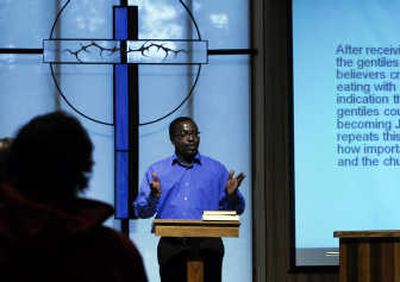Professor is conduit between cultures

He is a man of many worlds.
Fourteen years after he first left his home in Africa, Moses Pulei continues to straddle two cultures – the one he was born into as a member of the Maasai, a semi-nomadic tribe in southern Kenya and northern Tanzania; and another that’s thousands of miles away, where he’s a professor of theology at Spokane’s Whitworth University.
Despite the stark differences between the arid lands of East Africa’s Rift Valley and the pine-covered campus of the liberal arts school, Pulei is able to balance these contrasting ways of life by spending at least four months a year in his hometown of Namanga.
Now, Pulei’s hope is to weave these worlds together.
This fall, Whitworth University launched its “East Africa Initiative,” a new program that will connect students, faculty and people in the region with members of the Maasai tribe and others in Africa. Designed to equip Whitworth students to become “global Christians,” the initiative will entail cross-cultural visits and home stays, pastoral training, internships and other exchanges that will involve travel, study and intense dialogue.
To foster those connections, Pulei – a 1997 graduate of Whitworth – will serve as a bridge between cultures.
This initiative isn’t about erecting buildings or doling out money to “fix” Africa, Pulei stressed. Instead, it’s about building relationships based on mutual respect. “Money is not the point,” he said. “We want to empower people there and show (Whitworth) students what Africa is about.”
American perspectives about Africa tend to be limited, he said. There’s the “CNN Africa,” in which the continent is portrayed as a grim, violent place plagued with genocide, AIDS and civil war; the “Hemingway/National Geographic” Africa, a viewpoint that’s overly romanticized; and then there’s this stereotype of Africans as “the noble savage.”
“All these things are true to a certain extent, but we want people to see beyond these images because Africa is so much more,” Pulei said.
At the same time, students who experience life with the Maasai and others in East Africa also broaden their perspectives – not only by learning about a different way of life and culture, but by stretching themselves and moving beyond their comfort zones, said Jerry Sittser, one of several Whitworth University professors who helped launch the “East Africa Initiative.”
Sittser, who has taught religion to Whitworth students since 1989, is among several faculty members who have spent time traveling and working in Africa. With this new program, their hope is to expand students’ horizons by learning about and helping a part of the world where Christianity is quickly spreading.
While mainline Protestant denominations are experiencing a decline in membership in the West, these churches are witnessing explosive growth in Africa and other parts of the world. In 1900, the continent was home to only 10 million Christians (less than 10 percent of the total population at the time), according to a 2004 article in Christianity Today. Now, Christians make up 50 percent of Africa’s population at 360 million.
“The African church has a pressing need for better pastoral training,” according to a summary of the “East Africa Initiative.” “The problem is not winning people to Christ; it is establishing them in the faith. … Africa does not need more western evangelism, more western books, more western interference; it needs more African pastors and lay leaders equipped to develop an effective ministry to their own people in a way that is culturally appropriate to Africa.”
And that’s where Pulei’s work is again instrumental, Sittser said. Because he belongs to the Maasai tribe, Pulei is no stranger to the cultural needs of his people. Although he has spent the past decade studying in the United States, Pulei has returned to his people every summer. During these visits, he brings medicine, vaccinations and supplies, as well as colleagues from the United States who want to learn about tribal life. Pulei also helps train Christian pastors among the Maasai.
“It’s so humbling every time I go back to the village,” said Pulei, who was born in a mud-and-stick hut and spent his childhood tending his family’s sheep.
Pulei also speaks nine African languages and has established relationships with many Maasai – from tribal leaders and people in government to church pastors and children who play in the fields.
“It really helps when you are a product of the culture,” Sittser said.
Like others in his village, Pulei attended a Roman Catholic-run classroom and converted to Christianity as a result of his relationship with sponsors at World Vision, a Christian relief and development organization. Pulei learned about Whitworth from Young Life missionaries, who encouraged him to apply to the school.
Thanks to the sponsorship of Christian missionaries in Florida as well as a partial scholarship from Whitworth, Pulei ended up moving to Spokane. As a college student, he was a popular figure on campus. Pulei was elected student body president during his senior year and was chosen to be the school’s homecoming king – twice.
After graduation, he continued to travel back and forth between Kenya and the United States, where he pursued a master’s degree and is now earning a doctoral degree at Fuller Theological Seminary. While at home in Namanga one summer, he met his future wife – a Christian missionary based out of California. Moses and Brittany Pulei have been married for seven years and are the parents of a 6-year-old daughter.
Since he returned to Whitworth this summer to be part of the East Africa Initiative, Pulei has been teaching several religion classes.
Pulei said he is committed not only to his people in East Africa, but also to the students at Whitworth.
“The world is becoming a global village,” Pulei said. “This is my chance to mentor students and help them understand what it means to be a citizen of the world.”